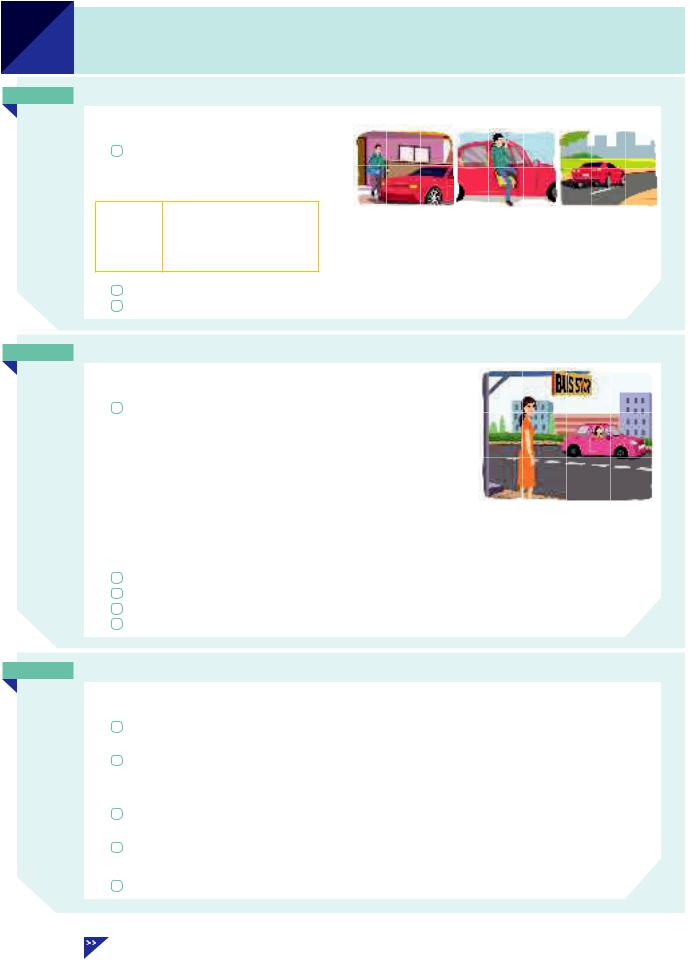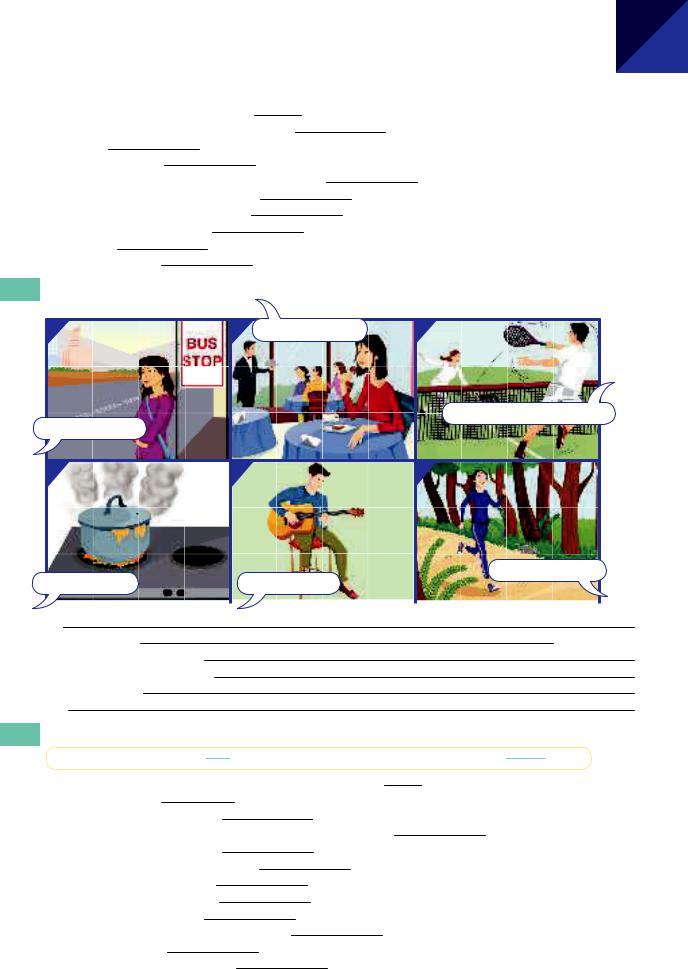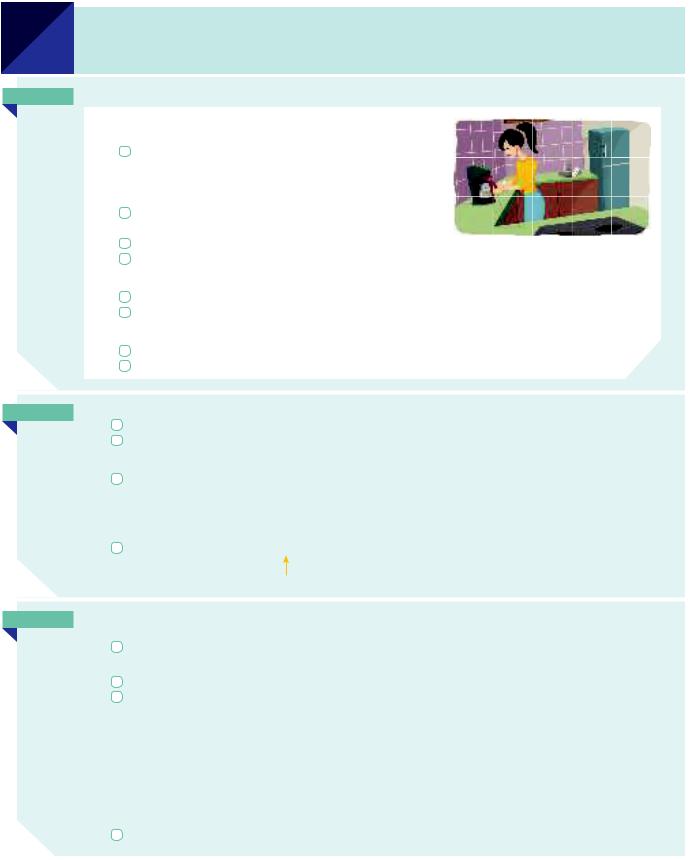
- •Contents
- •Thanks
- •To the student
- •To the teacher
- •3 Present continuous and present simple 1 (I am doing and I do)
- •10 Present perfect continuous and simple (I have been doing and I have done)
- •11 how long have you (been) … ?
- •12 for and since when … ? and how long … ?
- •13 Present perfect and past 1 (I have done and I did)
- •14 Present perfect and past 2 (I have done and I did)
- •15 Past perfect (I had done)
- •16 Past perfect continuous (I had been doing)
- •17 have and have got
- •18 used to (do)
- •19 Present tenses (I am doing / I do) for the future
- •20 I’m going to (do)
- •21 will and shall 1
- •22 will and shall 2
- •23 I will and I’m going to
- •24 will be doing and will have done
- •26 can, could and (be) able to
- •27 could (do) and could have (done)
- •28 must and can’t
- •29 may and might 1
- •30 may and might 2
- •31 have to and must
- •32 must mustn’t needn’t
- •33 should 1
- •34 should 2
- •35 I’d better … it’s time …
- •36 would
- •39 if I knew … I wish I knew …
- •40 if I had known … I wish I had known …
- •41 wish
- •42 Passive 1 (is done / was done)
- •43 Passive 2 (be done / been done / being done)
- •44 Passive 3
- •45 it is said that … he is said to … he is supposed to …
- •46 have something done
- •47 Reported speech 1 (he said that …)
- •48 Reported speech 2
- •49 Questions 1
- •52 Question tags (do you? isn’t it? etc.)
- •53 Verb + -ing (enjoy doing / stop doing etc.)
- •54 Verb + to … (decide to … / forget to … etc.)
- •55 Verb (+ object) + to … (I want you to …)
- •56 Verb + -ing or to … 1 (remember, regret etc.)
- •57 Verb + -ing or to … 2 (try, need, help)
- •58 Verb + -ing or to … 3 (like / would like etc.)
- •59 prefer and would rather
- •60 Preposition (in/for/about etc.) + -ing
- •61 be/get used to … (I’m used to …)
- •63 there’s no point in -ing, it’s worth -ing etc.
- •64 to … , for … and so that …
- •65 Adjective + to …
- •66 to … (afraid to do) and preposition + -ing (afraid of -ing)
- •67 see somebody do and see somebody doing
- •68 -ing clauses (He hurt his knee playing football.)
- •69 Countable and uncountable 1
- •70 Countable and uncountable 2
- •71 Countable nouns with a/an and some
- •74 the 2 (school / the school etc.)
- •75 the 3 (children / the children)
- •77 Names with and without the 1
- •78 Names with and without the 2
- •79 Singular and plural
- •80 Noun + noun (a bus driver / a headache)
- •81 -’s (your sister’s name) and of … (the name of the book)
- •82 myself/yourself/themselves etc.
- •83 a friend of mine my own house on my own / by myself
- •84 there … and it …
- •85 some and any
- •87 much, many, little, few, a lot, plenty
- •90 all every whole
- •91 each and every
- •92 Relative clauses 1: clauses with who/that/which
- •94 Relative clauses 3: whose/whom/where
- •95 Relative clauses 4: extra information clauses (1)
- •96 Relative clauses 5: extra information clauses (2)
- •97 -ing and -ed clauses (the woman talking to Tom, the boy injured in the accident)
- •98 Adjectives ending in -ing and -ed (boring/bored etc.)
- •99 Adjectives: a nice new house, you look tired
- •100 Adjectives and adverbs 1 (quick/quickly)
- •102 so and such
- •104 quite, pretty, rather and fairly
- •105 Comparative 1 (cheaper, more expensive etc.)
- •106 Comparative 2 (much better / any better etc.)
- •107 Comparative 3 (as … as / than)
- •108 Superlative (the longest / the most enjoyable etc.)
- •109 Word order 1: verb + object; place and time
- •110 Word order 2: adverbs with the verb
- •111 still any more yet already
- •112 even
- •114 in case
- •116 as (as I walked … / as I was … etc.)
- •117 like and as
- •119 during for while
- •121 at/on/in (time)
- •122 on time and in time at the end and in the end
- •123 in/at/on (position) 1
- •124 in/at/on (position) 2
- •125 in/at/on (position) 3
- •126 to, at, in and into
- •127 in/on/at (other uses)
- •129 Noun + preposition (reason for, cause of etc.)
- •130 Adjective + preposition 1
- •131 Adjective + preposition 2
- •132 Verb + preposition 1 to and at
- •134 Verb + preposition 3 about and of
- •135 Verb + preposition 4 of/for/from/on
- •136 Verb + preposition 5 in/into/with/to/on
- •137 Phrasal verbs 1 Introduction
- •138 Phrasal verbs 2 in/out
- •139 Phrasal verbs 3 out
- •142 Phrasal verbs 6 up/down
- •143 Phrasal verbs 7 up (1)
- •144 Phrasal verbs 8 up (2)
- •145 Phrasal verbs 9 away/back
- •Additional exercises
- •Study guide
- •Key to Exercises
- •Key to Additional exercises (see page 302)
- •Key to Study guide
- •Index

Unit
67 see somebody do and see somebody doing
AStudy this example situation:
Tom got into his car and drove of. You saw this.
You can say:
I saw Tom get into his car and drive of.
We say ‘I saw him do something’ (= he did it
and I saw this). In the same way, you can say:
tom
hear
listen to somebody do something watch something happen feel
I didn’t hear you come in. (you came in – I didn’t hear this)
Lisa suddenly felt somebody touch her on the shoulder.
BStudy this example situation:
Yesterday you saw Kate. She was waiting for a bus.
You can say:
I saw Kate waiting for a bus.
We say ‘I saw her doing something’ (= she was doing it and I saw this).
In the same way, you can say:
hear |
|
kate |
listen to |
|
|
|
|
|
watch |
somebody doing something |
|
feel |
something happening |
|
smell |
|
|
find |
|
|
|
|
|
I could hear it raining. (it was raining – I could hear it)
Listen to the birds singing!
Can you smell something burning?
We looked for Paul and finally we found him sitting under a tree eating an apple.
CStudy the diference in meaning:
I saw him do something = he did something and I saw this. I saw the complete action from start to finish:
He jumped over the wall and ran away. I saw this. → I saw him jump over the wall and run away. They went out. I heard this. → I heard them go out.
I saw him doing something = he was doing something and I saw this. I saw him in the middle of doing something (not from start to finish):
I saw Tom as I drove past in my car. He was walking along the street. → I saw Tom walking along the street.
I heard them. They were talking. → I heard them talking.
Sometimes the diference is not important and you can use either form:
I’ve never seen her dance. or I’ve never seen her dancing.
134 |
Past simple (I did) Unit 5 Past continuous (I was doing) Unit 6 |

Exercises
67.1 |
Complete the sentences with the verb in the correct form: |
|
|||||
1 |
a |
Tom doesn’t have the keys. He |
gave |
them to Lisa. (give) |
|
||
|
|
b Tom doesn’t have the keys. I saw him |
them to Lisa. (give) |
||||
2 |
a |
A car |
outside our house, and then it drove of |
again. (stop) |
|||
|
|
b We heard a car |
|
outside our house, and then it drove of again. (stop) |
|||
3 |
a Ben gave me the envelope and watched me |
it. (open) |
|||||
|
|
b Ben gave me the envelope and I |
|
it. (open) |
|
||
4 |
a |
Sarah is Canadian. I heard her |
|
she’s from Toronto. (say) |
|||
|
|
b Sarah is Canadian. She |
|
she’s from Toronto. (say) |
|||
5 |
a |
A man |
over in the street, so we went to help him. (fall) |
||||
|
|
b We saw a man |
|
over in the street, so we went to help him. (fall) |
|||
67.2 You and a friend saw, heard or smelt something. Complete the sentences.
Unit
67
1 |
2 Look! There’s Clare. |
3 |
Look! There’s David and Helen.
Look! There’s Kate.
4 |
5 |
6 |
|
|
|
|
Look! There’s Linda. |
|
What’s that smell? |
Listen. That’s Bill. |
|
|
||
|
|
|
|
|
|
1 |
We saw Kate waiting for a bus |
. |
|||
2 |
We saw Clare |
|
in a restaurant. |
||
3 |
We saw David and Helen |
|
. |
||
4 |
We could smell something |
|
. |
||
5 |
We could hear |
|
. |
||
6 |
|
|
. |
||
67.3 Complete the sentences. Use these verbs (in the correct form):
|
crawl cry explode |
get |
happen |
lie put |
ride |
say slam |
stand |
tell |
1 |
The bus stopped at the bus stop but I didn’t see anybody |
get |
of. |
|||||
2 |
I saw two people standing |
outside your house. I don’t know who they were. |
||||||
3 |
I thought I heard somebody |
|
‘Hi’, so I turned round. |
|||||
4 |
There was an accident outside my house, but I didn’t see it |
. |
|
|
||||
5 |
Listen. Can you hear a baby |
|
? |
|
|
|
|
|
6 |
I know you took the key. I saw you |
it in your pocket. |
||||||
7 |
We listened to the old man |
|
his story from beginning to end. |
|||||
8 |
Everybody heard the bomb |
|
. It was a tremendous noise. |
|||||
9 |
Oh! I can feel something |
|
up my leg. It must be an insect. |
|||||
10 |
I looked out of the window and saw Dan |
|
his bike along the road. |
|||||
11 |
I heard somebody |
a door in the middle of the night. It woke me up. |
||||||
12 |
When I got home, I found a cat |
|
on the kitchen table. |
|||||
135

Unit
68 -ing clauses (He hurt his knee playing football.)
AStudy this example:
Kate is in the kitchen. She’s making cofee. You can say:
Kate is in the kitchen making cofee.
 -ing clause
-ing clause 
You can use -ing in this way when two things happen at the same time:
A man ran out of the house shouting.
(= he ran out of the house and he was shouting)
Do something! Don’t just stand there doing nothing! Be careful crossing the road.
We also use -ing when one action happens during another action:
Joe hurt his knee playing football. (= while he was playing)
Did you cut yourself shaving? (= while you were shaving)
You can also say ‘while doing something’ and ‘when doing something’:
Joe hurt his knee while playing football.
Be careful when crossing the road. (= when you are crossing)
BWhen one action happens before something else, we use having (done) for the first action:
Having found a hotel, we looked for somewhere to eat.
Having finished her work, she went home.
You can also say ater -ing:
Ater finishing her work, she went home.
These structures are used more in written English than in spoken English.
When we begin a sentence with ‘Having (done something)’ or ‘Ater (doing something)’, we write a comma (,) ater this part of the sentence:
Having finished her work, she went home.
comma
CYou can also use -ing to explain something, or to say why somebody does something.
The sentence usually begins with -ing:
Feeling tired, I went to bed early. (= because I felt tired)
 -ing clause
-ing clause 
Being unemployed, he doesn’t have much money. (= because he is unemployed) Not having a car, she finds it dif icult to get around.
(= because she doesn’t have a car)
We use having (done) for something that is complete before something else:  Having seen the film twice, I didn’t want to see it again.
Having seen the film twice, I didn’t want to see it again.
(= because I had seen it twice)
These structures are used more in written English than in spoken English.
When we begin a sentence with -ing (Feeling tired … / Not knowing … / Having seen … etc.), we write a comma (,) ater this part of the sentence.
Not knowing what to do, I called my friend to ask her advice.
136

Exercises |
Unit |
68 |
|
|
|
68.1 Choose from Box A and Box B to make sentences. Use -ing.
A |
1 |
Kate was in the kitchen. |
B |
She was trying not to make a noise. |
|
2 |
Amy was sitting in an armchair. |
|
She looked at the sights and took pictures. |
|
3 |
Nicola opened the door carefully. |
|
She said she would be back in an hour. |
|
4 |
Sarah went out. |
|
She was reading a book. |
|
5 |
Lisa worked in Rome for two years. |
|
She was making cofee. |
|
6 |
Anna walked around the town. |
|
She was teaching English. |
|
|
|
|
|
1 Kate was in the kitchen making coffee.
2 Amy was sitting in an armchair
3 Nicola
4
5
6
68.2 Put the words in the right order.
1 Joe (knee / football / his / hurt / playing) Joe
2I (in the rain / wet / got / very / walking) I
3Laura (to work / had / driving / an accident) Laura
4My friend (of / slipped / a bus / getting / and fell) My friend
5Emily (trying / her back / a heavy box / to lit / hurt) Emily
6Two people were (to put out / by smoke / the fire / overcome / trying) Two people were
68.3Complete the sentences. Use Having + a suitable verb.
1 |
Having finished her work, Katherine let the ofice and went home. |
2 |
our tickets, we went into the theatre and took our seats. |
3 |
the problem, I think we’ll be able to find a solution. |
4 |
he was hungry, Joe now says he doesn’t want to eat anything. |
5 |
his job recently, James is now unemployed. |
6 |
most of his life in London, Sam has now gone to live in a small village |
|
in the country. |
68.4Make one sentence from two. Begin with -ing or Not -ing. Sometimes you need to begin with Having … . Don’t forget the comma (,).
1 |
I felt tired. So I went to bed early. |
|
Feeling tired, I went to bed early. |
2 |
I thought they might be hungry. So I ofered them something to eat. |
|
I ofered them something to eat. |
3 |
Robert is a vegetarian. So he doesn’t eat any kind of meat. |
|
Robert doesn’t eat any kind of meat. |
4 |
I didn’t have a phone. So I had no way of contacting anyone. |
|
I had no way of contacting anyone. |
5 |
Sarah has travelled a lot. So she knows a lot about other countries. |
|
Sarah knows a lot about other countries. |
6 |
I wasn’t able to speak the local language. So I had trouble communicating. |
|
I had trouble communicating. |
7 |
We had spent nearly all our money. So we couldn’t aford to stay at a hotel. |
|
we couldn’t aford to stay at a hotel. |
137
